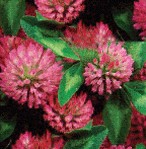

| Certificates/Standards: | N; |
| Monthly Output: | Not provided |
| Regional: | Not provided |
| Packaging Information: | Not provided |
| Mode Of Payment: | Not provided |
| Delivery Lead Time: | Not provided |
| Main Sales Markets: | North America,Central/South America,Western Europe,Eastern Europe,Australasia,Asia,Middle East,Africa |
| Sample Provided: | No |
| Sample Policy: | Not provided |
| Minimum Quantity: | Not provided |
English Name:Red Clover Extract
Latin Name:Trifolium Pratense L.
Other Name:Beebread; Cow Clover; Cow Grass; Meadow Clover; Purple Clover; Trefoil; Purple Clover; Broad Red; Wild Clover, Cleaver Grass, Marl Grass
[Specification]
Isoflavones 2.5%, 8%, 20%, 40% HPLC
[Appearance]
Black Brown Powder
[Description]
Red Clover is a hardy perennial of short duration that may be found in abundance throughout Europe, Asia, and the Mediterranean area, and it was introduced to Australia and North America (it is the state flower of Vermont). Red Clover is one of about 230 species of legumes that has been an important forage crop since the Middle Ages, and, in fact, Red Clover is the most important leguminous forage crop in northern Europe that not only benefits animals, but also rebuilds tired and worn out soil.
Red Clover is an erect-to-sprawling plant with long-stalked, hairy stems, arising from one root and bearing smooth leaves that are divided into three leaflets, hence, its botanical name, Trifolium, which is derived from two Latin words, tri, meaning "three" and folium, meaning "leaf." The stems bear purple-pink, tubular, fragrant flowers that are borne in globose heads that bloom in the late spring. Red Clover grows to a height of two feet and thrives in moist, well-drained, neutral soil in sun, and the flower heads with upper leaves are harvested in summer as they open and are dried as a sweet, cooling herb that is used in medicinal preparations.
Red Clover has been used by herbalists for years to treat various cancers. Used externally in poultices, it has been employed as a local application for cancerous growths (also leprosy, old ulcers, acne and pellagra). When taken internally, it is said to be helpful for serious diseases of the stomach, ovaries, breast, throat and lymphatic system. It has also been made into a gargle for the relief of esophageal disease, and the National Cancer Institute has substantiated the fact that Red Clover does, in fact, contain anti-cancer properties.
It is a deeply rooted plant, which is said to account for its abundance of minerals, and some of the constituents in Red Clover include beta-sitosterol, caffeic and other acids, coumarin, eugenol, flavonoids, methyl salicylate, salicylic acid, calcium, chromium, lecithin, choline, iron, magnesium, manganese, phosphorus, potassium, selenium, zinc, molybdenum, beta-carotene and vitamins B-3, C and E.
[Parts Used]
Whole Herb
[Functions]
Red clover is a source of many valuable nutrients including calcium, chromium, magnesium, niacin, phosphorus, potassium, thiamine, and vitamin C. Red clover is also considered to be one of the richest sources of isoflavones (water-soluble chemicals that act like estrogens and are found in many plants).
1. Cardiovascular Health
Menopause increases a woman's risk for developing cardiovascular disease. Supplementation with red clover isoflavones has been associated with a sizeable increase in high-density lipoprotein (HDL) cholesterol, or "good" cholesterol in pre- and postmenopausal women, leading some researchers to believe that these isoflavones may help protect against cardiovascular disease. Other studies, however, have refuted this finding. Interestingly, one recent study found that menopausal women taking red clover supplements experienced a significant improvement in arterial compliance (a measure of the strength and resilience of the arterial walls). Arterial compliance diminishes during menopause and may increase a woman's risk for heart disease.
2. Menopause
While not all studies are thoroughly convincing, several studies of a proprietary extract of red clover isoflavones suggest that it may significantly reduce hot flashes in menopausal women.
3. Osteoporosis
Menopause increases a woman's risk for developing osteoporosis (significant bone loss). Some studies suggest that a proprietary extract of red clover isoflavones may slow bone loss and even boost bone mineral density in pre- and perimenopausal women.
4. Cancer
The isoflavones isolated from red clover have been studied for their effectiveness in treating some forms of cancer. It is thought that the isoflavones prevent the proliferation of cancer cells and that they may even destroy cancer cells. Laboratory and animal studies have found that red clover isoflavones may protect against the growth of breast cancer cells. This is surprising because estrogens (and isoflavones have estrogenic properties) have generally been thought to stimulate the growth of breast cancer in women. Until further research has been conducted and more information is available, the use of red clover isoflavones or other red clover products should probably be avoided in women with a history of breast cancer.
5. Other Uses
Traditionally, red clover ointments have been applied to the skin to treat conditions such as psoriasis, eczema, and other rashes. Red clover also has a history of use as a cough remedy for children.
[Contraindications]
1. Side Effects
No serious adverse side effects from red clover have been reported in humans. However, infertility has been noted in grazing animals that consume large amounts of red clover.
2. Pregnancy and Breastfeeding
The use of red clover is not recommended for pregnant or breastfeeding women.
3. Interactions and Depletions
Because of the estrogen-like properties in red clover isoflavones, women with a history of breast cancer should avoid red clover (some studies suggest that synthetic and/or natural estrogens may increase the risk of breast cancer). Red clover isoflavones should be used with caution, if at all, by people receiving hormone therapy (including birth control pills) containing estrogen, progesterone, androgen or any derivatives of these hormones. Because of the increased risk of bleeding associated with red clover, individuals taking blood-thinning medications (such as warfarin or aspirin) or blood-thinning herbs and supplements (such as ginkgo, ginger, garlic, and vitamin E) should avoid red clover.






